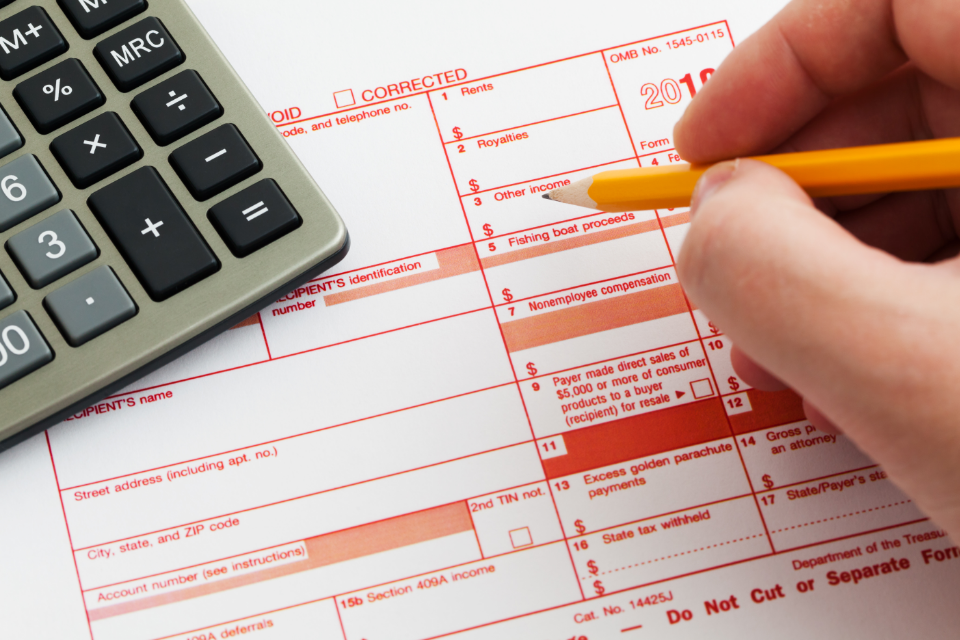IRS Form 1099: Reporting Payments Beyond Traditional Employment
When it comes to reporting income, IRS Form 1099 plays a crucial role in capturing payments that fall outside traditional employment. Whether you’re an independent contractor or a landlord, understanding which 1099 form you need is vital for compliance. Missed details can lead to hefty penalties and complications come tax time. Curious about the different types of 1099 forms and who needs to file them? Let’s explore this essential aspect of tax reporting.
Understanding IRS Form 1099
What is a 1099 form? Understanding IRS Form 1099 is crucial, especially since it plays a key role in accurately reporting various types of income.
So, what’s a 1099 form? It’s a federal income tax form used to report non-traditional income, like payments made to independent contractors. If you’re an independent contractor, you’ll likely receive the independent contractor tax form, known as Form 1099-NEC, if you earn over $600.
Additionally, if you receive rent or royalties, you might encounter Form 1099-MISC. These forms help ensure you report all taxable income, preventing any potential issues with the IRS. Knowing how to handle these forms can simplify your tax filing process and keep you compliant with tax regulations.
Different Types of 1099 Forms
When it comes to navigating your tax responsibilities, knowing the different types of 1099 forms can make a significant difference. Each form serves a specific purpose.
For instance, Form 1099-MISC reports miscellaneous income like rent or royalties, while Form 1099-NEC focuses on non-employee compensation for independent contractors. If you’ve earned interest from your bank, you’ll use Form 1099-INT, and for dividends from investments, there’s Form 1099-DIV.
Lastly, if you’ve sold real estate, Form 1099-S captures the gross proceeds. To simplify your filing process, you can find a printable 1099 form online, ensuring you have the right one at your fingertips for accurate reporting. Knowing these forms is key to staying compliant with IRS regulations.
Who Needs to File a 1099?
Who needs to file a 1099? If you’re an independent contractor or freelancer who earned $600 or more from a client, you must receive a Form 1099-NEC from them.
Landlords receiving rental income or royalty payments should expect a Form 1099-MISC. If you sold real estate, the buyer should provide you with Form 1099-S to report gross proceeds. You also need to issue a 1099 for any reportable payments you make that meet these criteria. Remember, payments below $600 don’t require a 1099, but that doesn’t mean they’re not taxable.
Stay organized and informed, so you accurately report your income and avoid potential penalties. Keep track of any payments you receive throughout the year.
Nonemployee Compensation Reporting
If you’ve earned income as an independent contractor or freelancer, it’s crucial to be aware of nonemployee compensation reporting. When you receive payments totaling $600 or more from a business, they’ll issue you Form 1099-NEC. This form specifically reports nonemployee compensation, ensuring that your income is documented for tax purposes.
You’ll need to include this income when filing your taxes, as it’s considered taxable. Keep accurate records of your earnings and any related expenses, as this will help you during tax season.
Rental Income and Form 1099-MISC
As an independent contractor, you might be familiar with the importance of reporting your income, but rental income has its own set of rules. If you receive rental payments, you’ll likely need to report this income using Form 1099-MISC.
This form is essential for documenting payments over $600 made to you as a landlord. It ensures that both you and your tenants are compliant with IRS regulations. Remember, even if you don’t receive a 1099-MISC, you’re still responsible for reporting the income on your tax return. Keep good records of your rental agreements, payment receipts, and any related expenses to make your tax preparation smoother. Understanding these requirements can help you avoid potential issues with the IRS.
Interest and Dividend Income
Interest and dividend income play a crucial role in your overall financial picture. When you earn interest from savings accounts, bonds, or other investments, it’s typically reported on Form 1099-INT. This form helps you track the interest income you need to report on your tax return.
Similarly, if you own stocks or mutual funds that pay dividends, you’ll receive Form 1099-DIV, detailing your dividend earnings. Both forms ensure you’re aware of the income that may not come from traditional employment, helping you maintain accurate tax records.
Reporting Real Estate Transactions
When it comes to real estate transactions, accurate reporting is vital for tax purposes. If you sell real estate, you’ll need to report the gross proceeds using Form 1099-S. This form captures essential details like the sale date, property address, and the amount received.
It’s crucial to issue this form if you’re a seller, as failing to report can lead to complications with the IRS. Similarly, if you receive rental income, you’ll likely report that through Form 1099-MISC. This ensures you’re documenting your income correctly and fulfilling your tax obligations.
Always keep records of your transactions to simplify the reporting process and avoid potential issues down the line. Accurate reporting protects you and helps maintain compliance with tax regulations.
Thresholds for Reporting Payments
Understanding the thresholds for reporting payments is crucial for ensuring compliance with IRS regulations. You need to report payments if you’re an independent contractor earning $600 or more in a calendar year, which requires you to file Form 1099-NEC.
Similarly, if you receive rent or royalty payments, you’ll use Form 1099-MISC for amounts exceeding $600. For interest income, Form 1099-INT comes into play once you earn $10 or more.
If you sell real estate, you must report gross proceeds using Form 1099-S, regardless of the amount. Payments below these thresholds don’t necessitate filing a 1099, but keep in mind they’re still taxable. Staying informed about these limits helps you avoid potential pitfalls in your tax reporting.
Consequences of Not Filing a 1099
Failing to file a 1099 can lead to serious repercussions, including hefty penalties from the IRS. If you neglect to report payments made to independent contractors or other reportable income, you risk facing fines that can add up quickly.
The IRS typically imposes a penalty for each 1099 form you fail to file, which can escalate based on how late the filing occurs. Additionally, if you’re audited and your payments go unreported, you could owe back taxes along with interest and further penalties.
Ignoring your 1099 obligations can also raise red flags, potentially leading to more scrutiny of your financial records. In short, not filing a 1099 can have significant and costly consequences for you.
Best Practices for 1099 Compliance
Not filing a 1099 can lead to significant penalties and increased scrutiny from the IRS, making it vital to stay compliant with reporting requirements.
Start by tracking payments to independent contractors, ensuring you issue a 1099-NEC for anyone you pay $600 or more. Keep accurate records of all transactions and confirm the taxpayer identification numbers (TINs) of recipients. Use the correct form type—like 1099-MISC for rents or 1099-INT for interest payments. Don’t forget to file your forms on time, both with the IRS and to the recipients.
Consider using accounting software to streamline the process and minimize errors. Regularly review IRS guidelines to stay updated on compliance changes. This proactive approach can save you from costly penalties.
Conclusion
In summary, understanding IRS Form 1099 is crucial for anyone involved in reporting non-traditional income. Whether you’re an independent contractor, a landlord, or an investor, knowing which 1099 form to use and when to file it can save you from penalties. Stay compliant by keeping accurate records and filing on time. By following best practices, you’ll ensure that your income is reported correctly, helping you avoid unnecessary headaches come tax time.
Keep an eye for more latest news & updates on Gravity Internet Net!





